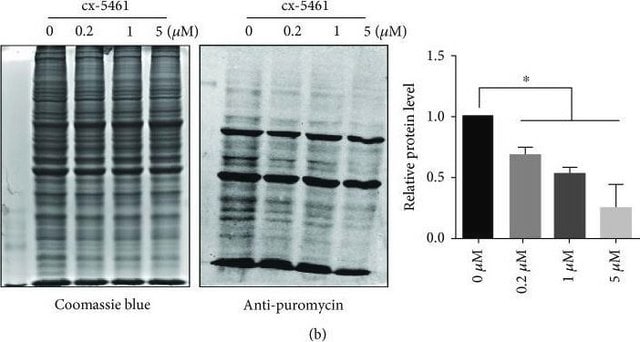General description
Protein Kinase C (PKC) is a family of serine/threonine (Ser/Thr)-specific protein kinases. PKC is a phospholipid-dependent enzyme, activated by the lipid 1,2-diacylglycerol (DAG). The protein kinase C delta (PKC δ) isoenzyme appears to be widely expressed in the brain, lung, heart, spleen, liver, ovary, pancreas, thymus, adrenal gland, skin and rat embryonic fibroblasts, and is expressed in lower levels in certain mouse fibroblasts. PKD is also located in the cytosol, nuclear compartment and in mitochondria in response to cellular stress.
Specificity
Anti-Protein Kinase C δ specifically reacts in dot-blot immunoassay with PKC δ peptide conjugated to BSA with 1-ethyl-3-(3-dimethylamino-propyl)-carbodiimide (EDCI).
Immunogen
Synthetic peptide corresponding to the C-terminal variable (V5) region (amino acids 662-673) of rat PKC δ coupled to KLH with glutaraldehyde.
Application
Anti- protein kinase c δ antibody may be used in:
- immunoprecipitation
- immunohistochemistry
- immunoblotting
- ELISA
- chemiluminescence detection systems to detect PKC δ
- dot-blot immunoassay
Applications in which this antibody has been used successfully, and the associated peer-reviewed papers, are given below.
Western Blotting (1 paper)Biochem/physiol Actions
Protein Kinase C isotype δ (PKCδ) modulates the inflammatory response. It acts as a signal transducer of several signaling pathways. Hence it can be considered as a vital therapeutic target to treat sepsis induced-lung injury. In sepsis, PKCδ participates in platelet-mediated activation. Overexpression and stimulation of PKC δ leads to cell division arrest in Chinese hamster ovary (CHO) cells and growth inhibition of NIH3T3 cells.
Protein kinase C (PKC) has a pivotal role in cell growth and differentiation, modulation of neurotransmission, signal transduction and oncogenesis. Anti-protein kinase c δ antibody can be used for studying the differential tissue expression and intracellular localization of PKC δ. It can also be used in western blotting and microarray.
Physical form
Rabbit Anti-Protein Kinase C δ is supplied as liquid containing 0.1% sodium azide as preservative.
Storage and Stability
For continuous use, store at 2-8 °C for up to one month. For extended storage freeze in working aliquots. Repeated freezing and thawing is not recommended.Storage in "frost-free" freezers is not recommended. If slight turbidity occurs upon prolonged storage, clarify the solution by centrifugation before use.
Disclaimer
Unless otherwise stated in our catalog or other company documentation accompanying the product(s), our products are intended for research use only and are not to be used for any other purpose, which includes but is not limited to, unauthorized commercial uses, in vitro diagnostic uses, ex vivo or in vivo therapeutic uses or any type of consumption or application to humans or animals.







